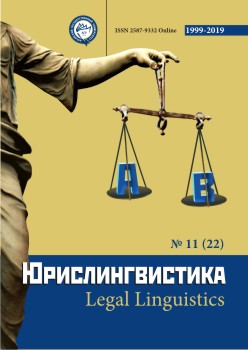CONCEPT OF GOOD FAITH IN THE LANGUAGE OF THE RUSSIAN LAW: HISTORY AND PRESENT
Abstract
The article discusses the diachronic study of influence of national social and ethical values on the legal sphere. It allows to track development of moral and legal representations in the Russian culture. The language of the legal communication is learned as the objective reflection of the legal consciousness. The object of the research is the ways of the nomination of the concept of good faith in the language of the Russian law. There has been made a continuous sampling of the corresponding legal nominations from the codes, legislative and other acts. There has been discovered insufficient terminological definition of these nominations both in the legislation, and in special encyclopedic literature. The overlap of social-ethical and legal semantics in the concept of good faith is noted basing on common-language semantics and the contextual analysis, its proximity with the generic concept of legitimacy is shown. The history of development in the Russian legislation of the nominative group with «sovest» nucleus is reconstructed from the 18th century on. The linguo-cognitive analysis is made, the transformation of semantic structure of the nominations and their cognitive contents in the modern Russian legal consciousness is shown: decrease of the importance of the concept «conscience» and increase of the importance of the concept «law» is fixed in the semantics of legitimacy. The linguoculturological analysis is made, the axiological status of the concept of conscientiousness in the history and the present of the Russian right is defined. The signs of the ethnocultural identity of legal language consciousness in history and the present are revealed. The ethnocultural importance of the ethical concept «conscience», its historical link to concepts «soul», «good», «justice», «truth», «honesty» is noted. The ethnocultural image of the conscientious legal entity communicated by the Russian legislative texts throughout several centuries is reconstructed. The employment of this image is considered as the component of the speech strategy of integral impact on logical, emotional and belief spheres of the consciousness of a legal entity. There has been revealed the communicative-pragmatic risk when combining initial social-ethical meaning of good faith and its derivative for the legal sphere (effect of the insufficient accuracy of the legal instructions).
Downloads
Metrics
References
Большая юридическая энциклопедия / авт.-сост. А. Б. Барихин. М., 2010.
Колесов В. В., Колесова Д. В., Харитонов А. А. Словарь русской ментальности: в 2 т. СПб., 2014.
Полное собрание законов Российской Империи. Собрание первое. С 1649 по 12 декабря 1825 года. СПб., 1830.Полное собрание законов Российской Империи. Собрание второе. – СПб., 1830–1884.
Словарь Академии Российской: в 6 ч. СПб., 1792.
Словарь современного русского литературного языка. Т. III. М.; Л., 1954.
Тихомирова Л. В., Тихомиров М. Ю. Юридическая энциклопедия / под ред. М. Ю. Тихомирова. М., 1997.
References
Big Legal encyclopedia. (2010). [Bolshaya yuridicheskaya ehnciklopediya]. A. B. Barikhin (Ed.). Мoscow (in Russian).
Complete collection of laws of the Russian Empire. The First collection. From 1649 to December 12, 1825. (1830). [Polnoe sobranie zakonov Rossijskoj Imperii. Sobranie pervoe. S 1649 po 12 dekabrya 1825 goda]. St. Petersburg (in Russian).
Complete collection of laws of the Russian Empire. The Second collection (1885). [Polnoe sobranie zakonov Rossijskoj Imperii. Sobranie vtoroe]. St. Petersburg (in Russian).
Dictionary of Academy Russian. (1792). [Slovar' Akademii Rossijskoj]. St. Petersburg (in Russian).
Dictionary of the modern Russian literary language. (1954). [Slovar' sovremennogo russkogo literaturnogo yazyka]. V. III. Moscow; Leningrad (in Russian).
Kolesov, V. V., Kolesova, D. V., Haritonov, A. A. (2014). Dictionary of the Russian mentality [Slovar' russkoj mental'nosti]. St. Petersburg (in Russian).
Tikhomirova, L. V., Tikhomirov, M. Yu. (1997). The legal encyclopedia [Yuridicheskaya ehnciklopediya]. M. Yu. Tikhomirov (Ed.). Moscow (in Russian).
Copyright (c) 2019 Людмила Попова

This work is licensed under a Creative Commons Attribution 4.0 International License.
The authors, which are published in this journal, agree to the following conditions:
1. Authors retain the copyright to the work and transfer to the journal the right of the first publication along with the work, at the same time licensing it under the terms of the Creative Commons Attribution License, which allows others to distribute this work with the obligatory indication of the authorship of this work and a link to the original publication in this journal .
2. The authors retain the right to enter into separate, additional contractual agreements for the non-exclusive distribution of the version of the work published by this journal (for example, to place it in the university depository or to publish it in a book), with reference to the original publication in this journal.
3. Authors are allowed to post their work on the Internet (for example, in a university repository or on their personal website) before and during the review process of this journal, as this may lead to a productive discussion, as well as more links to this published work (See The Effect of Open Access).











